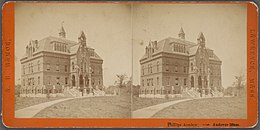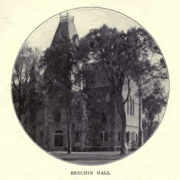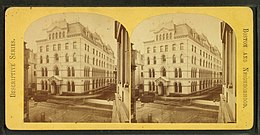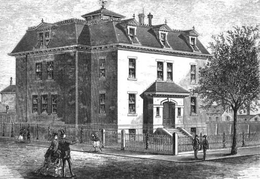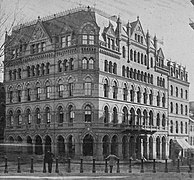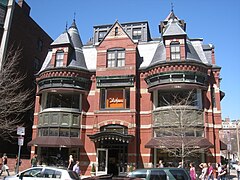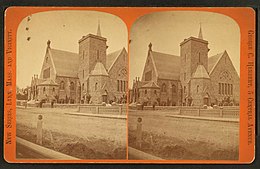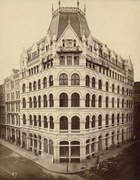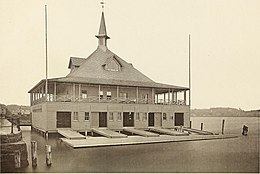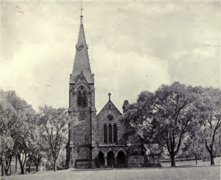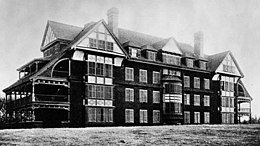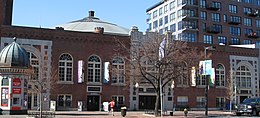Cummings and Sears
| Cummings & Sears | |
|---|---|
| Practice information | |
| Founders | Charles Amos Cummings, Willard T. Sears |
| Founded | 1864 |
| Dissolved | 1889 |
| Location | Boston, Massachusetts |

Cummings and Sears (est. 1864) was an architecture firm in 19th-century Boston, Massachusetts, established by Charles Amos Cummings and Willard T. Sears.[1]
History and legacy
[edit]In the 1860s they kept an office in the Studio Building on Tremont Street,[2] moving in the 1870s to Pemberton Square.[3][4]
Although most of their works are concentrated in New England, they also were commissioned to design buildings as far west as Utah as well as on Campobello Island in New Brunswick, Canada. Their best known work is Old South Church in Boston, completed in 1875.
Architects who worked in the office of Cummings & Sears include Charles L. Bevins of Rhode Island and Warren R. Briggs and Edward A. Cudworth of Connecticut.
Several of their buildings have been listed on the United States National Register of Historic Places, and others contribute to listed historic districts.
Architectural works
[edit]- Academy Hall, Phillips Academy, Andover, Massachusetts (1865, demolished)[5]
- Brechin Hall, Andover Theological Seminary, Andover, Massachusetts (1866, demolished)[5]
- Sears Building, Boston, Massachusetts (1868-69, demolished 1967)[6]
- Capen School (former), South Boston, Boston, Massachusetts (1870-71)[7]
- Mason & Hamlin Store, Boston, Massachusetts (1870, demolished)[8]
- Hotel Boylston, Boston, Massachusetts (1871, demolished 1897)[9]
- Carriage house at "Peacefield," Quincy, Massachusetts (1872)[10]
- House for Charles Amos Cummings, Boston, Massachusetts (1872)[11]
- House for Willard T. Sears, Boston, Massachusetts (1872)[12]
- New England Hospital for Women and Children, Roxbury, Boston, Massachusetts (1872, NRHP 1985)[10]
- Congregational House, Boston, Massachusetts (1873, demolished)[13]
- First Universalist Church, Lynn, Massachusetts (1873, demolished)[14]
- Old South Church, Boston, Massachusetts (1873-75, NRHP 1970)[10]
- Bedford Block, Boston, Massachusetts (1874-75, NRHP 1979)[10]
- Macullar, Parker & Company Store, Boston, Massachusetts (1874, demolished)[15]
- Montgomery Building, Boston, Massachusetts (1874, demolished)[16]
- Yale University Boathouse, New Haven, Connecticut (1874-75, demolished 1910)[17]
- Stone Chapel, Andover Theological Seminary, Andover, Massachusetts (1875-76, demolished)[5]
- Grand Opera House, New Bedford, Massachusetts (1881-82, demolished)[18]
- House for Charles James Sprague, Boston, Massachusetts (1881)[19]
- Tyn-Y-Coed and Tyn-Y-Maes Hotels, Campobello Island, New Brunswick, Canada (1882-83, demolished)[20]
- Cyclorama Building, Boston, Massachusetts (1884, altered 1923, NRHP 1973)[10]
- Union Chapel (former), Magnolia, Massachusetts (1884)[21]
- House for James H. Frothingham,[a] Dublin, New Hampshire (1885)[22]
- "Ullikana" for Alpheus Hardy, Bar Harbor, Maine (1885)[23]
- Magnolia Library, Magnolia, Massachusetts (1887)[24]
- Peoples Trust Company Building,[b] Farmington, Maine (1887)[25]
- Proctor Academy, Provo, Utah (1887, demolished)[26]
Gallery of architectural works
[edit]-
Academy Hall, Phillips Academy, Andover, Massachusetts, 1865.
-
Brechin Hall, Andover Theological Seminary, Andover, Massachusetts, 1866.
-
Sears Building, Boston, Massachusetts, 1868-69.
-
Capen School, South Boston, Boston, Massachusetts, 1870-71.
-
Mason & Hamlin Store, Boston, Massachusetts, 1870.
-
Hotel Boylston, Boston, Massachusetts, 1871.
-
House for Charles Amos Cummings, Boston, Massachusetts, 1872.
-
Congregational House, Boston, Massachusetts, 1873.
-
First Universalist Church, Lynn, Massachusetts, 1873.
-
Old South Church, Boston, Massachusetts, 1873-75.
-
Interior of the Old South Church, Boston, Massachusetts, 1873-75.
-
Bedford Block, Boston, Massachusetts, 1874-75.
-
Macullar, Parker & Company Store, Boston, Massachusetts, 1874.
-
Montgomery Building, Boston, Massachusetts, 1874.
-
Yale University Boathouse, New Haven, Connecticut, 1874-75.
-
Stone Chapel, Andover Theological Seminary, Andover, Massachusetts, 1875-76.
-
Tyn-Y-Coed Hotel Campobello Island, New Brunswick, Canada, 1882.
-
Magnolia Library, Magnolia, Massachusetts, 1887.
See also
[edit]Notes
[edit]- ^ A contributing property to the Dublin Village Historic District, NRHP-listed in 1983.
- ^ A contributing property to the Farmington Historic District, NRHP-listed in 1995.
References
[edit]- ^ Who's who in New England, Volume 3. 1915
- ^ Boston commercial directory for 1869
- ^ Boston Directory. 1873
- ^ Boston Almanac. 1879
- ^ a b c Roger G. Reed, "The Lost Victorian Campus" in Academy Hill: The Andover Campus, 1778 to the Present (New York: Princeton Architectural Press, 2000)
- ^ Edwin M. Bacon, King's Dictionary of Boston (Cambridge: Moses King, 1883): 27.
- ^ Auditor of Accounts' Annual Report of the Receipts and Expenditures of the City of Boston and the County of Suffolk, State of Massachusetts, for the Financial Year 1870-71 (Boston: City of Boston, 1871)
- ^ Robert D. Andrews, "Conditions of Architectural Practice Thirty Years and More Ago" in Architectural Review 5, no. 11 (November 1917): 237-238.
- ^ "The Illustrations" in American Architect and Building News 2, no. 70 (April 28, 1877): 133.
- ^ a b c d e Keith N. Morgan, Buildings of Massachusetts: Metropolitan Boston (Charlottesville: University of Virginia Press, 2009)
- ^ 230 Clarendon (109 Newbury)
- ^ 322 Marlborough
- ^ Proceedings at the dedication of the Congregational House, Boston, February 12th, 1873: together with a brief history of the American Congregational Association (1873)
- ^ "The Illustrations" in American Architect and Building News 1 (February 26, 1876): 68.
- ^ Moses Forster Sweetser, Macullar, Parker and Company, Boston, Mass: An Historical and Descriptive Sketch (Boston: 1884)
- ^ Architectural Sketch-book 2, no. 1 (July 1874)
- ^ "Yachting and Boating" in Forest and Stream 2, no. 8 (April 2 1874): 125.
- ^ Leonard Bolles Ellis, History of New Bedford and its Vicinity, 1602-1892 (Syracuse: D. Mason & Company, 1892)
- ^ 380 Marlborough
- ^ Kate Gannett Wells, Campobello: An Historical Sketch (1893)
- ^ "GLO.1163." mhc-macris.net. Massachusetts Historical Commission, n. d. Accessed January 13, 2022.
- ^ William Morgan, Monadnock Summer: The Architectural Legacy of Dublin, New Hampshire (Boston: David R. Godine, 2011)
- ^ Ullikana // 1885
- ^ "GLO.1164." mhc-macris.net. Massachusetts Historical Commission, n. d. Accessed January 13, 2022.
- ^ Farmington Historic District NRHP Registration Form (1995)
- ^ Seventh Annual Report of the New West Education Commission (Chicago: New West Education Commission, 1887)

